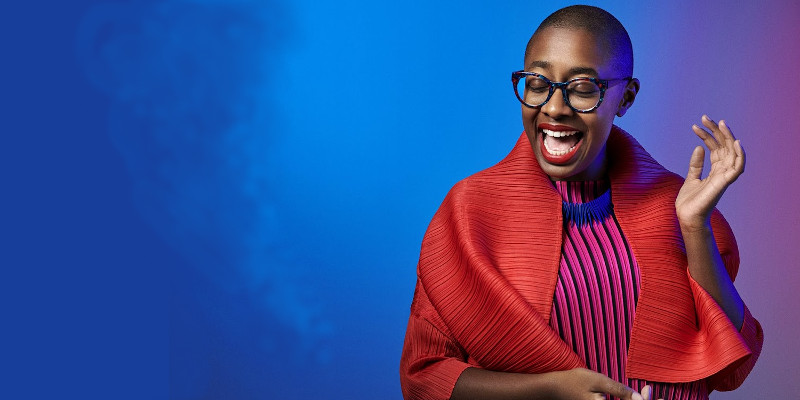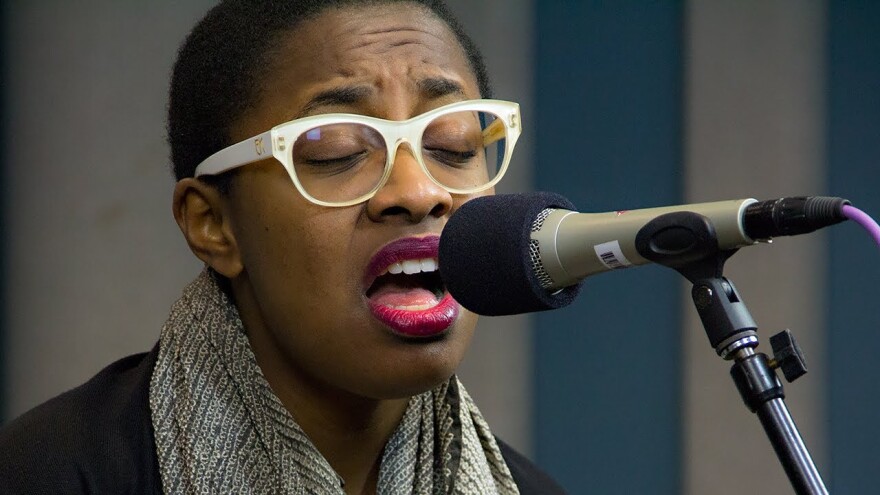
While she’s no stranger to Southern California audiences, vocalist Cécile McLorin Salvant’s show presented by CAP UCLA’s Royce Hall on January 26 reinforced her status as a one-of-a-kind singer. Through her idiosyncratic artistry, willingness to indulge the moment, and her genial manner, Salvant charmed and thrilled the near capacity of Royce’s floor.
In the broader sense, she’s one of the many daughters of Betty Carter—singers who rebuild a familiar song from the ground up, rearrange it almost to the point of non-recognition, and improvise over that framework. Those are dangerous waters, though, and Betty ruined more good singers than she bred. Salvant skates close to the edge of effusiveness, but always manages to tack back to the tonal and melodic. Unlike Carter and most of her acolytes, Salvant is not swing-centered.

She’s singular in a number of ways. Her vocal radius is near breath-taking: she has a precise falsetto, a strong middle register, and she can dip down into male-range chest tones. More subtle but no less important, Salvant can calibrate her vibrato—sometimes at three different settings on the same tune. She draws material from wildly divergent sources, and brings it in all in under a surprise-filled musical tent. Her personal style is, well, personal: a gossamer caftan flowed over a sequined dress with a feathered flounce, which topped strapless orange platforms.
Show tunes are an important component to Salvant’s music. Cabaret singing and jazz singing are as alike as chalk and cheese. In the former, singers use their gifts to pay homage to the song; for the latter, singers use the song to showcase their individuality. Like the late Wesla Whitfield, Salvant is one of the few who can bridge the two in meaningful ways. She prefaced her turn on “There’s No Business Like Show Business” with a quote from Elaine Stritch at Liberty (“As the prostitute once said–it’s not the work, it’s the stairs.”). The tune was driven by Keita Ogawa’s peppery drums, and it luxuriated in Salvant’s mercurial voice: girlish (“…Someday I’ll wake up…”) to full-throated (“Some-WHERE…”), glissing and sliding, with flashes of melisma and self-mockery, but a million miles away from Ethel Merman. The seldom-heard verse opened “Over the Rainbow” cleverly slid Munchkin-like refrains from “You’re Out of the Woods” in and out of the performance. And when she rode the brisk drum rhythm on the encore shuffle, it was briefly thrilling.
Her small but resourceful band buoyed Salvant and carried her throughout. Pianist Sullivan Fortner — Grammy-nominated for his arrangement of “Rainbow” — touched the century-old piano accompaniment for Bessie Smith’s “Sam Jones Blues,” brought the dissonant pounding in the piano-voice duet “Ghost Song,” and lacy lyricism to Sondheim’s “Being Alive’ from Company. Guitarist Marvin Sewell churned the tightly-strummed pulse of “Because,” and nylon-string finger-picking to Tim Hardin’s “Reason to Believe.” Alexa Tarantino’s flute interludes added instrumental color, especially her haunting bass flute solo on “Rainbow.”
Salvant may let her band’s reins loose, but she’s unquestionably the focal point: jumping from John Dowland’s old English ballad, “Flow Not So Fast Ye Fantasy” to Nina Simone’s streetwise “Ain’t Got No” from HAIR, waving her arm for emphasis as she improvises or taking “Reason to Believe” straight and folksy. She may not be everyone’s cup of tea, but Salvant is an original stylist. No one can take that away from her.
Kirk Silsbee publishes promiscuously on jazz and culture.
